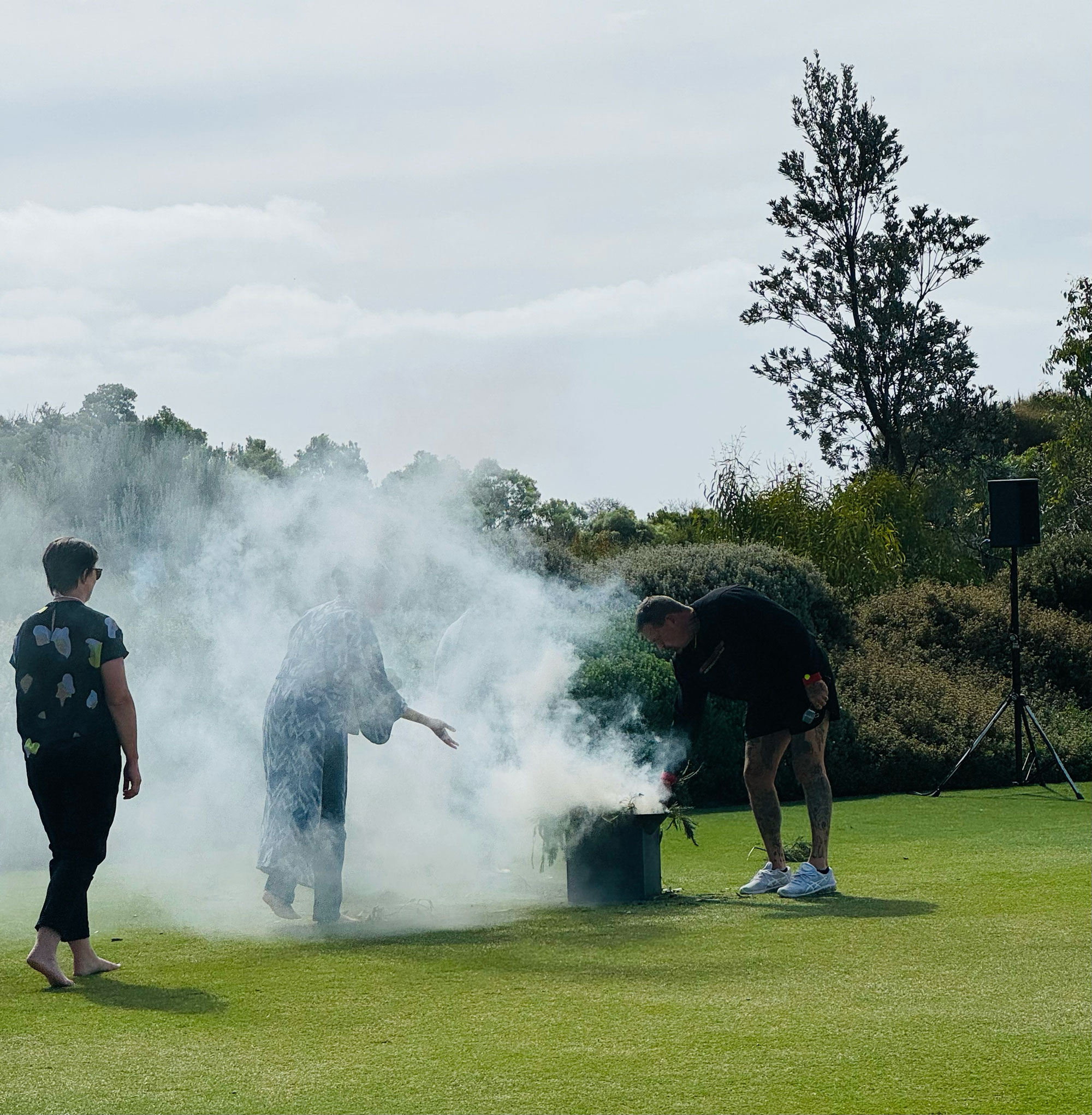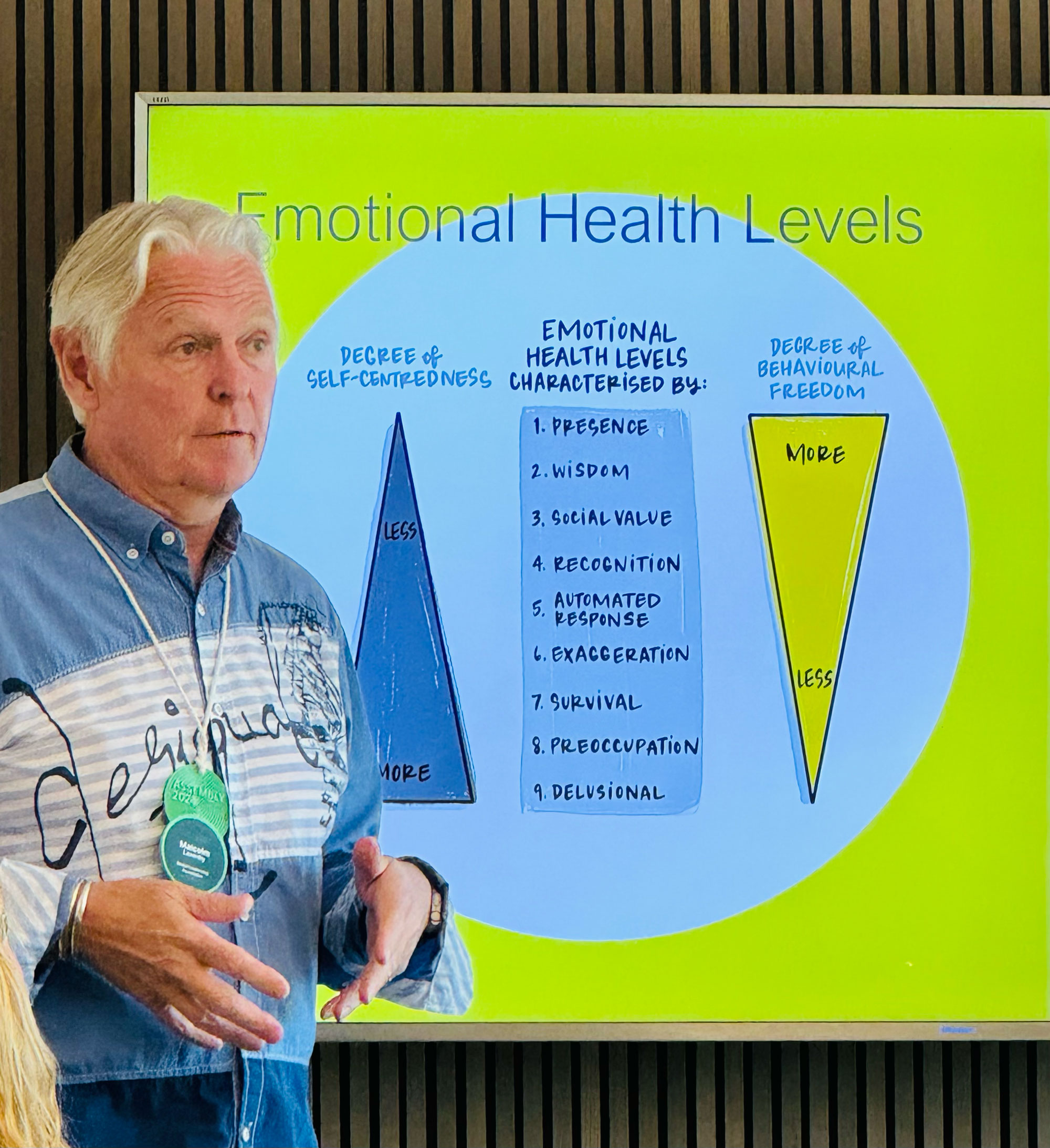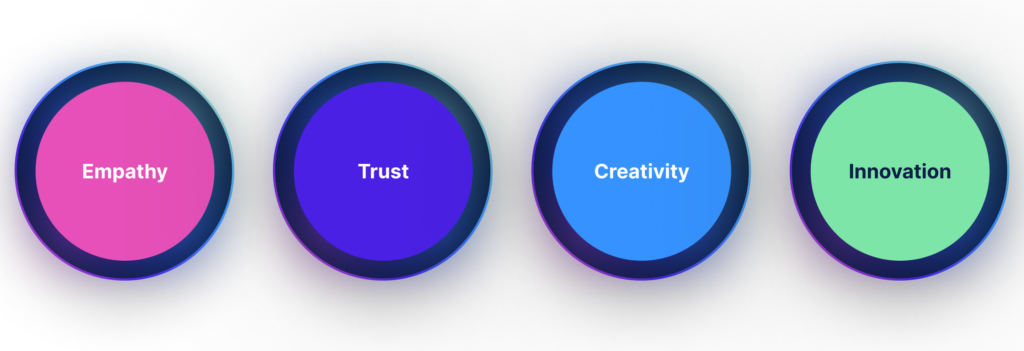Assembly 2024, a three-day event for B Corps designed for connection and catalysing change. “Assembly isn’t your run-of-the-mill multi-day conference, but it’s also more than just fun and games,” B Corp claimed on the website, and we can now confirm it to be true. It took time to ‘digest’ the deep concepts and big ideas that this event sparked in us, but we’re ready to share our summary.

A deep connection to the land and water
The event was hosted at the beautiful Cape Schanck, Victoria, on the Mornington Peninsula, home to the Boon Wurrung / Bunurong members of the Kulin Nation. From the Welcome to Country Smoking Ceremony to the yidaki meditation on the last day, Aboriginal and Māori cultures punctuated the event. More on that later (a lot more).
Is woke capitalism killing democracy?
The provocative title for this session didn’t disappoint as Professor Carl Rhodes, Dean of Business School (UTS) questioned exactly how genuine corporations are in their commitment to social issues and asked what their role is or should be. He proposes that the main role of corporations is to:
- Pay tax
- Provide Employment & pay decent wages
- Supply quality goods or services
- Drive innovation
Considering the crowd, it was a brave proposition, but this was when we knew we were not attending an echo chamber; we were here to have discussions, some of them uncomfortable. Rhodes went on to give some convincing examples of companies that were seemingly passionate about social issues. Notably, he questions Qantas and their almost branded stand on specific social issues when they fail to behave responsibly in other areas (providing quality goods or services, for example). Another example is PwC, which recently made news for all the wrong reasons. He was exceptionally knowledgeable on the topic (he has written a book on it), citing PwC’s Annual and Sustainability Report claims, they looked great… on paper. Additionally, the impact of your involvement with certain social issues is more challenging to measure, harder than let’s say… taxes.
So, what is the role of business in social change?
In contrast (and probably not an accident, rather great event programming) we heard from 2 business owners, Laura Thompson (Clothing the Gaps) and Michele Wilson (AWWA). As well as telling us about their fantastically interesting businesses, they directly reference and challenge the previous speaker’s notion that “paying tax and decent wages” is enough. They paint the picture that participating in social issues is a luxury afforded to white and the so-called Western businesses; Aboriginal businesses do not have the choice. Along with the obvious social justice issue that these First Nations and Indigenous companies face, there is, of course, the connection to the land, which makes them intrinsically connected to environmental issues.
One to five-year business plans and duties to shareholders [are] often at odds with doing business in a Western world. We plan 100 years in advance, and there are some Māori companies that have 500 year plans. There's a lack of ego in a 100 year business plan because you're not going to be alive for it; it's not about us, it's what we want it to look like for others when we are long gone.
Michele Wilson, AWWA
We do this because our children and our grandchildren are at the core of why we do business – not profits. 'Blak' businesses do things differently, B Corp just helps us explain why.
Laura Thompson (Gunditjmara), Clothing The Gaps
This notion was reiterated on day 2 by Michele Wilson (AWWA) and EllaRose Hammond (Tiraki Wines), in a talk entitled Why Māori businesses don’t need B Corp. Māori companies have been doing business’ the B Corp way’ long before B Corp was a thing. While certification can mean catalysing change for non-Māori companies, what is its value to Māori businesses?
Te awa atua – The divine river
AWWA provides a modern alternative product to traditional period products – comfy reusable environmentally-friendly period absorbent undies, thongs, boxer briefs and swimwear, that remove the hassle, waste and disruption from your period day.
Michele from AWWA gave an interesting insight into how we talk about our periods and what we learned the day they came and how different this is to how it was spoken about by our Tipuna (ancestors).
She discussed the importance of acknowledging a woman’s period in Maori culture and how accepting they are of a women on their period – the discomfort and pain and unsettling of the body and to provide space for a women to experience this in the most comfortable way possible. She discussed ways of addressing this in modern society and business, for example, taking a day to rest and putting an out-of-office email message on noting ‘I currently have my period and am taking some time to rest so my response time might be slightly delayed’.
Periods are a fact of life and, in Western society, have been something that’s often considered ‘gross, uncomfortable and not acceptable’, making women feel embarrassed or ashamed when having their period. However, in Maori culture, they refer to their period as the awa atua – the divine river and consider it to be celebrated as it is an ancient river linking generations of women back to their creation stories. The blood represented their own ancestors and their descendants. When it stopped flowing, it signalled the arrival of a new whanau.
AWWA aims to break down the barriers and unpack the stigma around periods that all women face to create a more empowering, sustainable and beautiful future.

Head, heart, and gut
Malcolm Lazenby From the Global Leadership Foundation ran an interactive workshop on “Tough Decisions”, where he used crowd participation to demonstrate human traits and how they apply to leadership and management roles. He began by explaining above and below the line. Operating above the line is open and positive. It’s about ownership, accountability and responsibility. Operating below the line is closed and negative. It’s about denial, excuses, defensiveness and blame. We need to identify when we’re operating below the line and pause until we get back above the line to take action or make decisions. Malcolm demonstrated that we all know what below the line looks like in our ‘heart of hearts’. And speaking of heart…..
He introduced the three centres of intelligence: the heart, the head and the gut.
- Engaging the ‘body centre’ or ‘the gut’ relies on environmental sensing and experience, known as instinct or ‘gut feel’, also termed the ‘doing centre’.
- The ‘heart centre’ relies on emotional connections with others, termed intuition or ‘feeling centre’.
- The ‘head centre’ involves objectively connecting perceptions, knowledge, and reasoning, known as insight or the ‘thinking centre’.
A balanced mixture of Heart, Head and Gut (both within an individual and a team) is critical. If you’re finding your projects have all the right ingredients, research, data, innovation, and creativity but are way behind schedule, you may need the gut(s) to execute it. walterwakefield has long been balancing our head and the heart traits, look, it’s even on our website.
![]()
What kind of change-maker are you?
Today, organisations face increasing pressure to address social issues, yet they also encounter criticism for being ‘too political.’ How can we authentically support causes in the workplace? What does meaningful solidarity mean for organisations? Alexander Dirksen of Past Futures hosted a session titled Beyond Statements of Support: Finding a Meaningful Role for Business, trying to workshop these questions.
He flashed a poignant graphic that made us reflect on the change makers we have within walterwakefield. Are you a sponsor, a storyteller, an influencer, a mobiliser, a convener, an amplifier, or a learner? He also made us look at our values and what looking into them says about social issues and our involvement.

Back to the land
At the expense of sounding repetitive, our reflection ends where it began: the connection to the land and the First Nations culture. On day two, we walked around with Skyla from Living Culture and heard about (and tasted) bush tucker foods and medicines. On day three, a session on “How to hear, not just listen” was hosted by Lionel, a Bunurong Elder from Living Culture. It was a great yarn about culture and deep listening, including a yidaki meditation. Yidaki is the original word for the instrument. Didgeridoo is not a word found in any of the First Nations languages but a European word.
Are you still reading?
Excellent, because we’re almost done. We went on a bushwalk, swam, did yoga, and danced to the Black Jesus Experience. Assembly 2024 was a warm (but stimulating) hug for all of our centres of intelligence. We met some great people and had critical conversations, some of which are still ongoing and concepts we are now cascading to others. Please reach out to Adrian or Alysia if you’d like to chat about anything B Corp.



